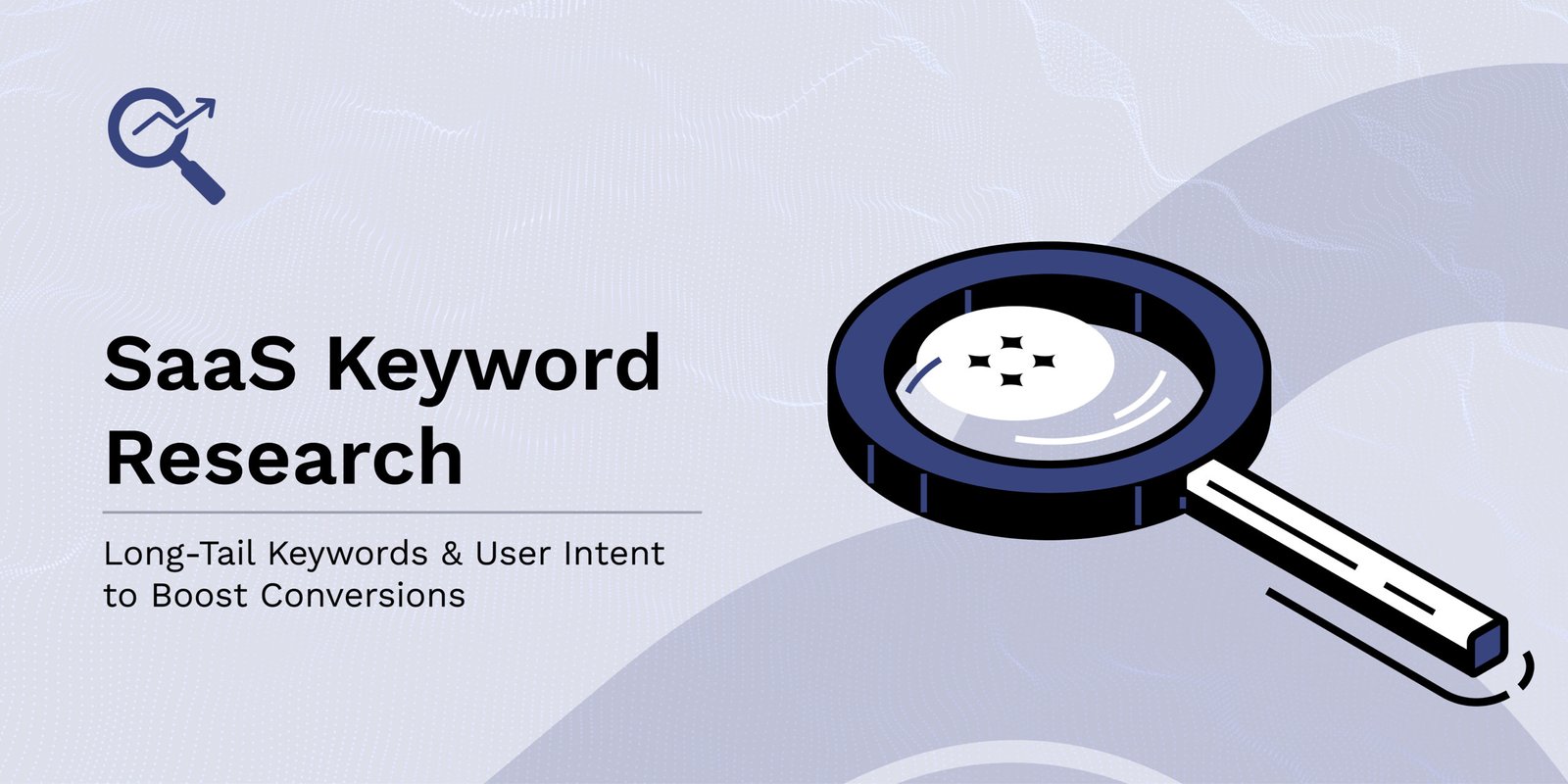Finding the right keywords is one of the most important steps in growing any SaaS business online. In 2025, with more competition than ever, keyword research is not just about traffic—it is about getting the right traffic that turns into users and customers.
This blog will help you understand how to do keyword research for your SaaS product. We will cover the best tools you can use, simple tips to follow, and mistakes to avoid. Whether you are just starting or already doing SEO, this guide will make keyword research easy to understand and apply. Let us get started.
What is Keyword Research and Why is it Important?

Before diving into the tools and tips, let’s quickly understand what is keyword research and why it is so vital for your SaaS business.
Keyword research is the process of identifying the specific words and phrases that people use when searching for products, services, or information on search engines like Google. For any business, including SaaS, understanding these search terms is essential because it allows you to tailor your content and marketing efforts to meet the needs of your potential customers.
Why Keyword Research Matters for SaaS
Keyword research is essential for SaaS businesses as it helps you connect with your target audience and drive organic traffic to your website. Here’s why it matters:
- Target the Right Audience: By identifying the keywords your audience is searching for, you can create content that directly answers their questions and needs.
- Increase Visibility: Proper keyword research helps your SaaS website appear in search engine results, increasing your chances of being found by potential customers.
- Improve Conversion Rates: Ranking for relevant, high-intent keywords means attracting users who are ready to take action, whether it’s signing up for a free trial or making a purchase.
- Stay Ahead of Competition: Knowing the keywords your competitors are targeting allows you to find gaps in their strategy and leverage those opportunities.
- Optimize Content: It helps you create valuable, SEO-optimized content that resonates with users, building trust and authority in your niche.
Understanding SaaS User Intent
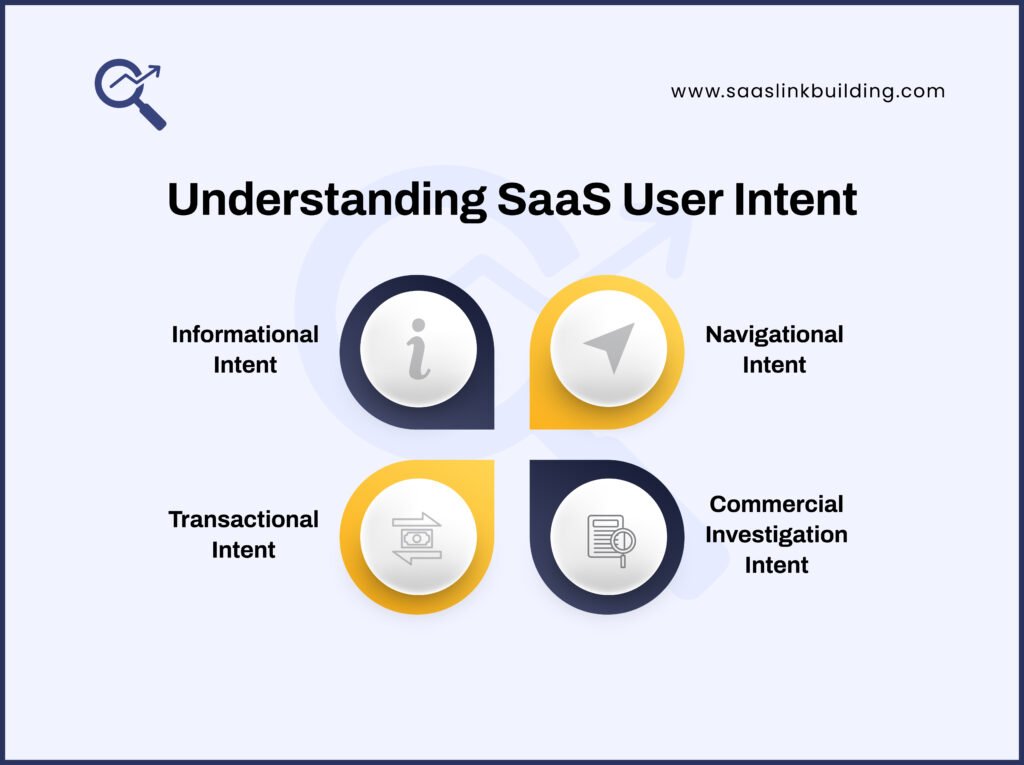
When performing keyword research for your SaaS business, it’s crucial to understand user intent—the reason behind a user’s search query. User intent helps you create content that directly addresses the needs of your audience. There are several types of user intent that can guide your keyword strategy:
- Informational Intent:
Users are looking for information. For example, a user might search for “What is SaaS?” or “how does SaaS work?”. These keywords indicate that the user is in the research phase and looking to learn more about your industry or product.
- Navigational Intent:
Users are trying to find a specific website or page. For instance, “Salesforce login” or “HubSpot support.” These keywords are often used by people who are already familiar with your brand or competitors and are looking to access specific resources.
- Transactional Intent:
Users are ready to make a purchase or take action. Keywords like “buy project management software” or “best CRM for small business” show that the user is looking to invest in a solution.
- Commercial Investigation Intent:
These users are researching products or services before making a buying decision. They might search for “best SaaS tools for startups” or “top CRM software for small business.” At this stage, the user is comparing options and gathering information to make a final choice.
Types of SaaS Keywords to Target
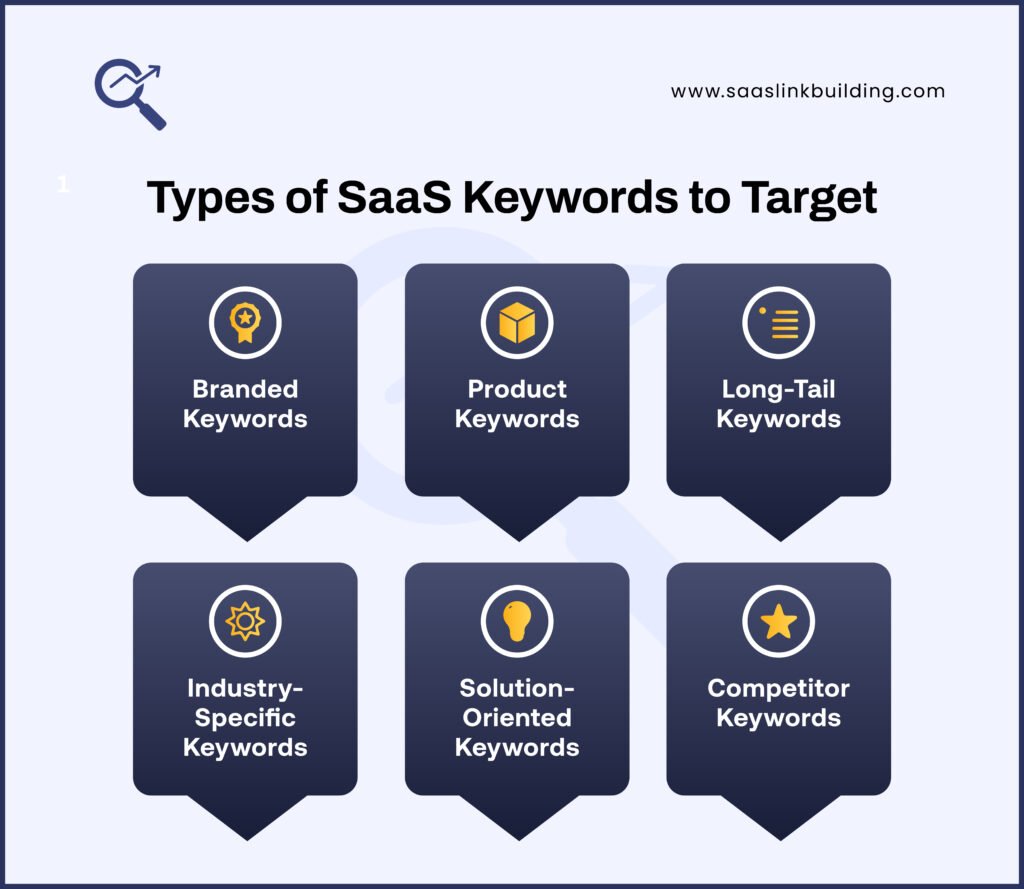
When doing keyword research, it’s essential to target the right types of keywords to drive the most relevant traffic. Below are the different types of keywords that are especially useful for SaaS businesses:
- Branded Keywords:
These keywords include the name of your company or product. For example, “Salesforce CRM” or “HubSpot marketing software.” Branded keywords help you attract people who are already familiar with your brand and are looking for your specific product or service.
- Product Keywords:
These are keywords related to the specific features or functionalities of your SaaS product. Examples include “cloud project management tools” or “automated marketing software.” Product keywords are valuable because they directly relate to what your software offers, and they attract users who are specifically searching for your solution.
- Long-Tail Keywords:
These are more specific, longer search phrases that typically have lower search volume but higher conversion potential. For instance, “best project management software for remote teams” or “CRM software for small businesses.” Long-tail keywords are less competitive and often attract users who are closer to making a purchase decision.
- Industry-Specific Keywords:
These keywords target specific industries or sectors that your SaaS product serves. For example, “SaaS for healthcare” or “CRM for real estate businesses.” These keywords allow you to narrow your focus to a particular market segment, improving your chances of attracting highly relevant traffic.
- Solution-Oriented Keywords:
These keywords address specific problems or needs your target audience is facing. For example, “how to improve team collaboration” or “increase sales with CRM.” These keywords capture users who are actively looking for solutions to their problems, making them valuable for driving traffic that is likely to convert.
- Competitor Keywords:
These are keywords that are related to your competitors’ brands or products. For example, “Salesforce vs HubSpot” or “best alternatives to QuickBooks.” Targeting these keywords allows you to capture users who are comparing your product to others and may lead to switching or trying your solution.
Top SaaS Keyword Research Tools in 2025
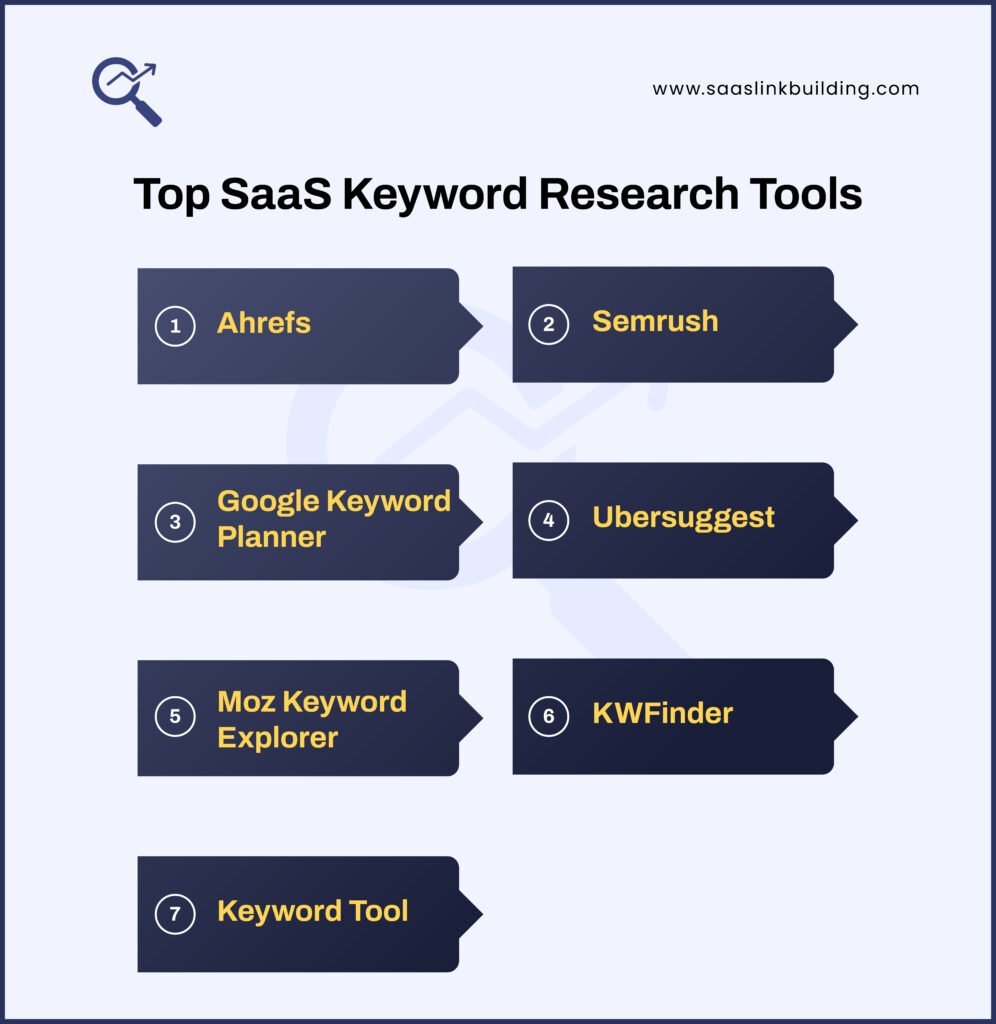
There are countless tools available for keyword research, but some are specifically designed for the needs of SaaS businesses. Below are the top tools that should be on your radar:
1. Ahrefs

Ahrefs is one of the most popular and powerful SEO tools out there. It has a keyword research tool that is perfect for SaaS businesses because it gives you detailed data on keyword search volume, keyword difficulty, and the competitiveness of certain keywords.
Why Ahrefs is great for SaaS:
- Keyword Difficulty: Ahrefs shows you how difficult it will be to rank for a keyword, which is critical for SaaS businesses looking to compete.
- Keyword Suggestions: Ahrefs provides related keyword ideas and long-tail keywords that are highly relevant to your SaaS product.
- SERP Overview: You can see the top-ranking pages for any keyword and understand why they are ranking.
2. SEMrush
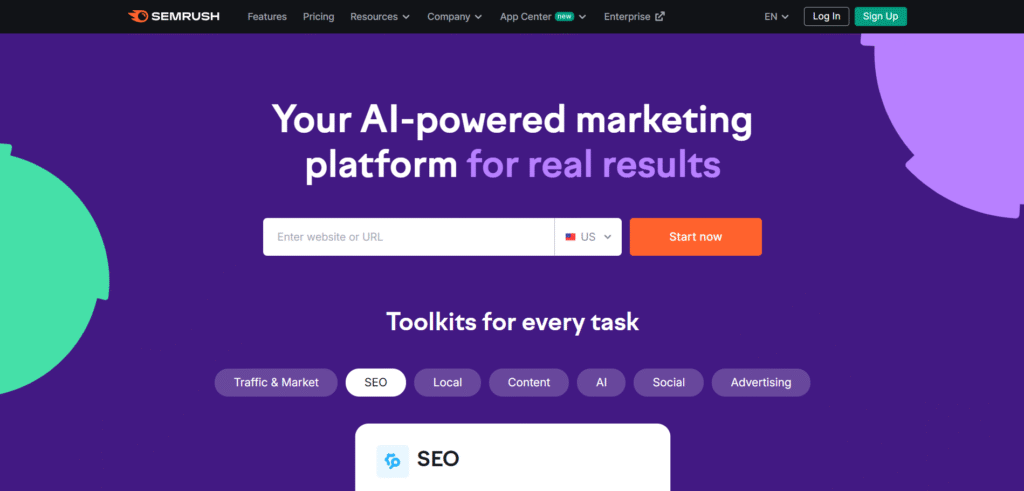
SEMrush is another great tool for keyword research and SEO. It’s known for its comprehensive keyword database and easy-to-use interface.
Why SEMrush is great for SaaS:
- Keyword Magic Tool: This tool gives you access to a vast keyword database and offers keyword variations that you can target.
- Competitive Research: You can see which keywords your competitors are ranking for, which is essential for discovering opportunities in your niche.
- Position Tracking: SEMrush allows you to track how well your keywords are performing over time.
3. Google Keyword Planner
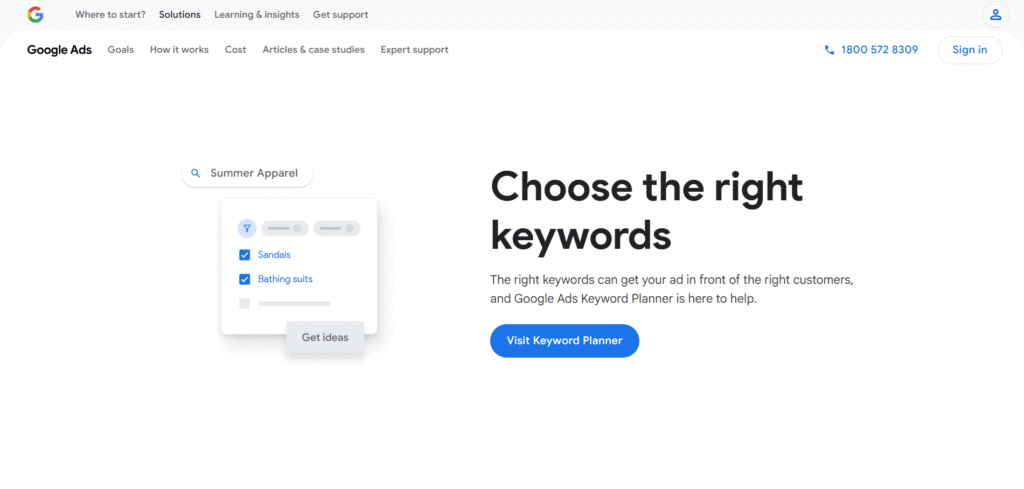
Google Keyword Planner is free and widely used by marketers. Though it’s a basic tool, it’s incredibly helpful for identifying keywords and checking their search volume.
Why Google Keyword Planner is great for SaaS:
- Accuracy: Since it comes directly from Google, you can be confident that the data is reliable.
- Search Volume: It helps you identify how many people are searching for specific keywords.
- Free to Use: Unlike other tools, Google Keyword Planner is completely free, making it a great starting point for SaaS businesses with smaller budgets.
4. Ubersuggest

Ubersuggest is a keyword research tool by Neil Patel that offers an affordable option for businesses looking to conduct keyword research without breaking the bank.
Why Ubersuggest is great for SaaS:
- Affordable: It offers a lot of value for a lower price than some of the bigger tools like Ahrefs or SEMrush.
- Keyword Suggestions: Ubersuggest provides keyword ideas, search volume, and competition data.
- User-Friendly Interface: It’s easy to use, making it a great choice for those new to keyword research.
5. Moz Keyword Explorer
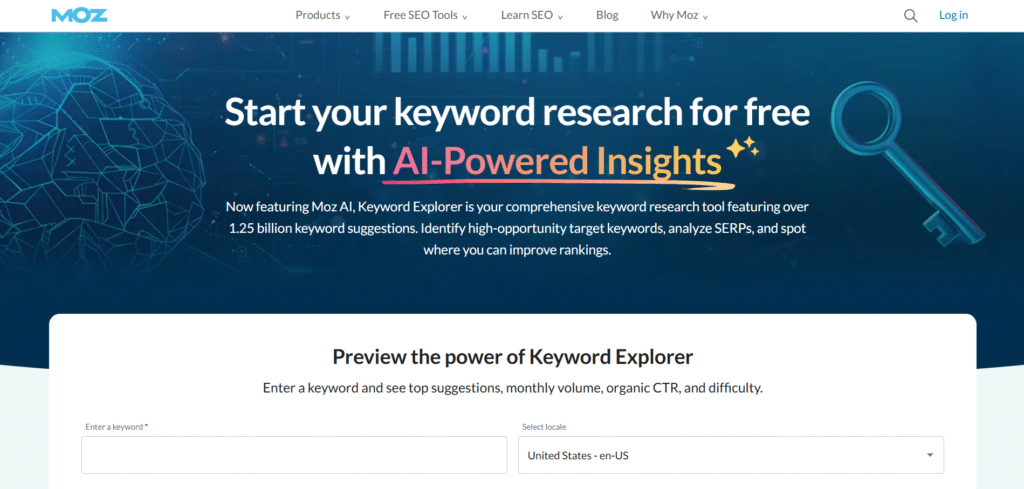
Moz is one of the most respected names in SEO, and their Keyword Explorer tool is fantastic for SaaS businesses. It helps you discover keyword opportunities, track performance, and analyze competition.
Why Moz Keyword Explorer is great for SaaS:
- Keyword Suggestions and Difficulty: Moz provides keyword difficulty scores, along with search volume and suggestions for related terms.
- SERP Analysis: You can analyze the current top-ranking pages for any given keyword.
- Organic CTR: Moz gives insights into the organic click-through rate (CTR) for a keyword, which is essential for understanding the real potential traffic.
6. KWFinder
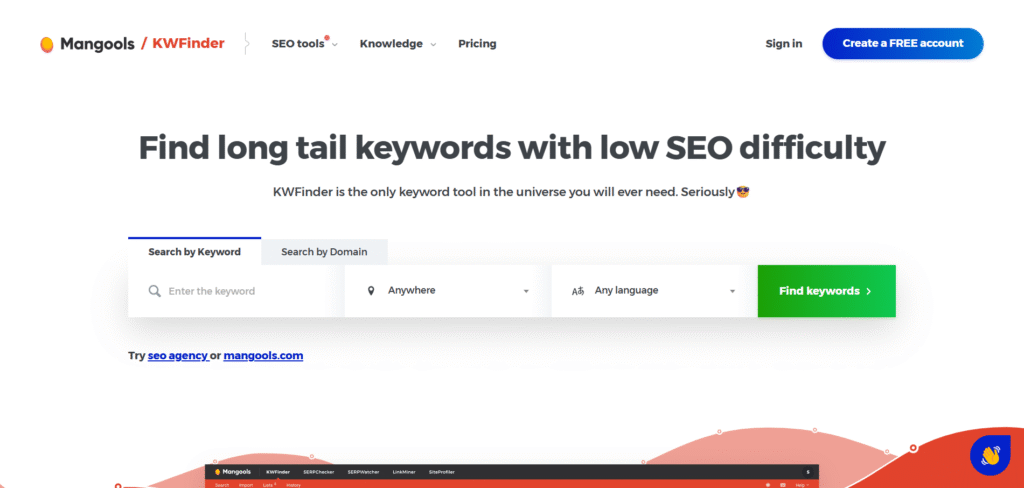
KWFinder is a user-friendly tool designed for people who want to find long-tail keywords with low SEO difficulty. It’s particularly useful for SaaS businesses that may be competing in niche markets with lower competition.
Why KWFinder is great for SaaS:
- Easy to Use: The simple interface makes it easy for anyone to use, even if you’re new to keyword research.
- Low SEO Difficulty Keywords: KWFinder helps you find keywords that are easier to rank for, making it great for SaaS companies with a smaller marketing budget.
- Keyword Suggestions: It provides keyword suggestions, search volume, and trend data to help you discover hidden opportunities.
7. Keyword Tool
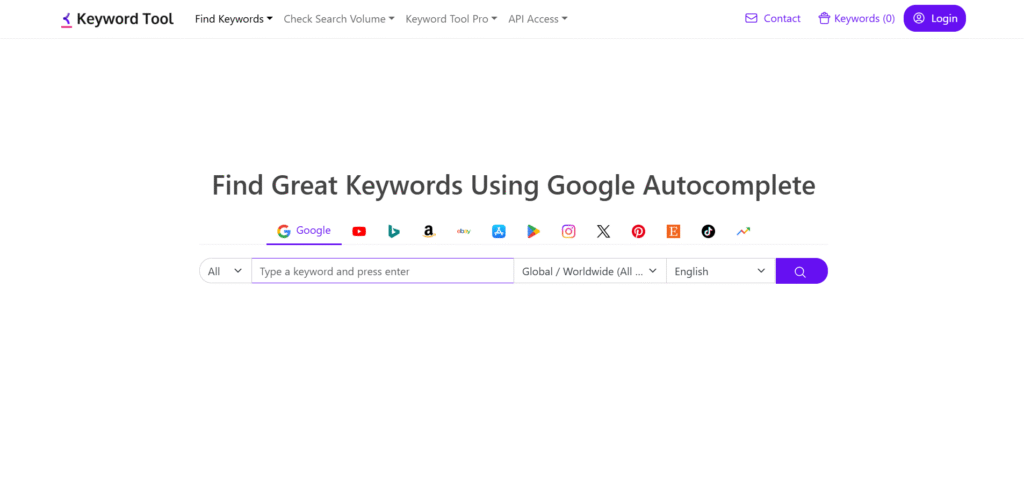
Keyword Tool is a great alternative to Google Keyword Planner, providing keyword suggestions based on autocomplete data from search engines like Google, YouTube, Amazon, and Bing.
Why Keyword Tool is great for SaaS:
- Multiple Platforms: It can be used to find keywords not only for Google but also for platforms like YouTube, which can help with video marketing for SaaS products.
- Long-Tail Keywords: Keyword Tool specializes in finding long-tail keywords, which are important for attracting highly targeted traffic.
- Free Plan Available: While there’s a paid version, the free plan provides valuable data to get started with keyword research.
Step-by-Step SaaS Keyword Research Process
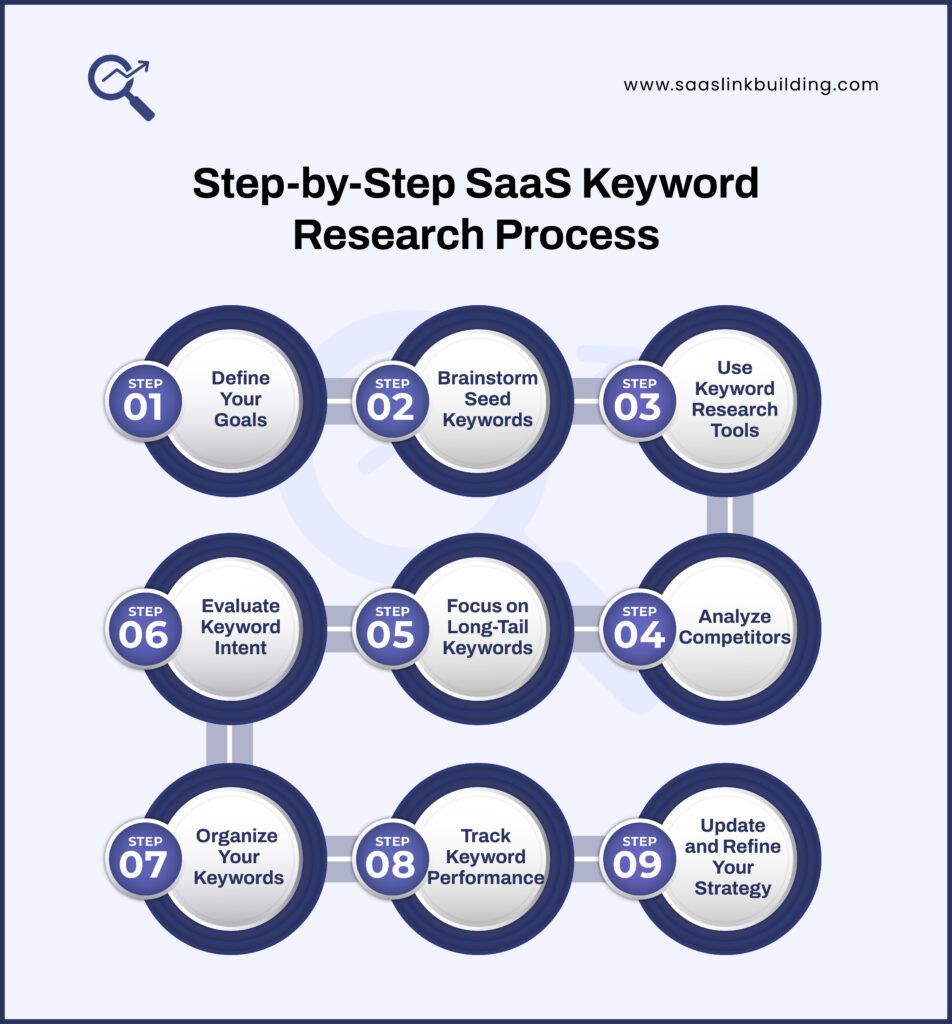
Performing effective keyword research for your SaaS business involves a structured approach. Below is a simple step-by-step process to guide you through the keyword research journey:
Step 1: Define Your Goals
Before starting your keyword research, it’s crucial to understand what you want to achieve. Are you aiming to increase traffic, improve conversions, or expand your audience? Knowing your goals will help you focus on the most relevant keywords for your business.
Step 2: Brainstorm Seed Keywords
Start by brainstorming a list of broad, high-level keywords related to your SaaS product. These are the foundational terms that describe your software, services, and key features. For example, if you provide project management software, seed keywords might include “project management tools,” “task management software,” or “collaboration tools.”
Step 3: Use Keyword Research Tools
Once you have your seed keywords, use keyword research tools (like Ahrefs, SEMrush, or Ubersuggest) to find related keywords. These tools will provide data on search volume, competition level, and related keywords. Look for keywords that match the intent of your target audience and have a good balance of search volume and competition.
Step 4: Analyze Competitors
Take a look at your competitors’ websites and identify the keywords they are ranking for. Tools like SEMrush and Ahrefs allow you to enter your competitor’s URL and find out which keywords are driving traffic to their site. This can help you uncover keyword opportunities you may have missed and identify gaps in your own keyword strategy.
Step 5: Focus on Long-Tail Keywords
Long-tail keywords may have lower search volume, but they tend to be more specific and less competitive, making it easier to rank for them. These keywords often have higher conversion potential because they attract users who are closer to making a decision. For example, “best project management software for remote teams” or “affordable CRM for small business.”
Step 6: Evaluate Keyword Intent
After gathering a list of potential keywords, evaluate the search intent behind them. Are users looking for information, comparing products, or ready to buy? Understanding user intent helps you create content that meets their needs and aligns with their stage in the buying journey.
Step 7: Organize Your Keywords
Group your keywords into categories based on topics, user intent, or the type of content you plan to create. For example, you can group keywords for blog posts, product pages, FAQs, or landing pages. Organizing your keywords helps you streamline your content creation process and ensures you are targeting the right keywords in the right places.
Step 8: Track Keyword Performance
Once you’ve implemented your keywords, it’s important to track their performance over time. Tools like Google Search Console, Ahrefs, or SEMrush allow you to monitor your keyword rankings and traffic. This helps you identify which keywords are working and which may need optimization or adjustment.
Step 9: Update and Refine Your Strategy
SEO and keyword research are ongoing processes. Regularly revisit your keyword strategy to adapt to changing search trends, industry developments, and business goals. This will ensure your SaaS business remains competitive and continues to attract high-quality traffic.
Now that you’ve mastered keyword research, it’s time to integrate these insights into a full marketing strategy. Explore our SaaS Marketing Guide for strategies that will help drive even more growth for your SaaS business in 2025.
Tips for Effective SaaS Keyword Research in 2025
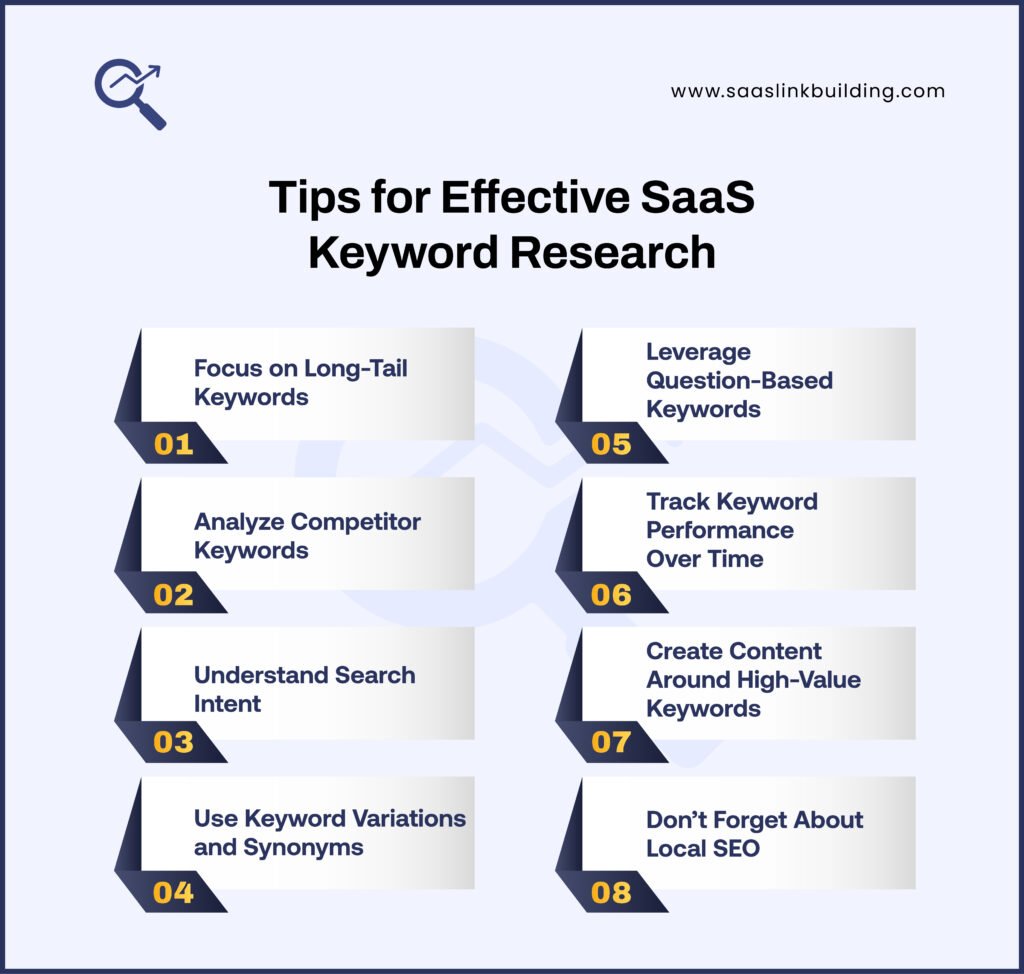
Now that you know keyword research process, it’s time to dive into some practical tips that will help you maximize your keyword research efforts.
1. Focus on Long-Tail Keywords
Long-tail keywords are longer and more specific keyword phrases that tend to have lower competition. For SaaS businesses, long-tail keywords can be particularly effective because they are more likely to match the intent of your audience.
For example, instead of targeting a broad keyword like “project management software,” try targeting long-tail keywords like “best project management software for remote teams” or “affordable project management tools for startups.” These long-tail keywords may have lower search volume, but they are often easier to rank for and attract highly relevant traffic.
2. Analyze Competitor Keywords
One of the best ways to find new keyword opportunities is to analyze your competitors. By looking at which keywords your competitors are ranking for, you can identify gaps in their strategy and find keywords that may be easier for you to target.
Use tools like SEMrush or Ahrefs to analyze your competitors’ keyword profiles. Look for keywords that they are ranking for but that you have not yet targeted, and consider creating content that targets those keywords.
3. Understand Search Intent
When doing keyword research, it’s important to understand the search intent behind the keywords. Search intent refers to the reason why someone is searching for a particular keyword.
By understanding search intent, you can ensure that your content is aligned with what users are actually looking for. This can help you attract more relevant traffic and improve your conversion rates.
4. Use Keyword Variations and Synonyms
Google has become very smart at understanding context, so don’t just focus on one exact keyword. Use variations, synonyms, and related terms to make your content more natural and engaging.
For example, if your target keyword is “cloud-based project management software,” you might also include variations like “online project management tools” or “cloud project management platforms.”
5. Leverage Question-Based Keywords
People often use search engines to ask questions. These question-based keywords (e.g., “how does SaaS work?” or “what are the best features of CRM software?”) are highly valuable because they match the exact queries users are typing into search engines.
Use tools like Answer the Public or Google’s People Also Ask to discover popular questions in your niche. Incorporate these questions into your content to address the needs of your audience directly.
6. Track Keyword Performance Over Time
Keyword research is not a one-time task. SEO is an ongoing process, and you need to continually track how your keywords are performing. By monitoring your keyword rankings, you can adjust your strategy and identify new opportunities.
Use tools like Google Search Console or SEMrush to track your keyword rankings and identify areas where you can improve.
7. Create Content Around High-Value Keywords
Once you’ve identified your target keywords, it’s time to create content around them. But don’t just throw a bunch of keywords into a blog post and call it a day. High-quality content is about answering your audience’s questions, providing real value, and establishing authority in your niche.
Make sure that your content is well-researched, informative, and engaging. Use your target keywords naturally within the content, but don’t over-optimize. Focus on delivering value to your audience first and foremost.
8. Don’t Forget About Local SEO
If your SaaS business serves specific geographic locations, don’t forget about local SEO. Many SaaS businesses overlook local search opportunities, but targeting location-based keywords can help you capture valuable local traffic.
For example, if your SaaS tool helps businesses in New York, try targeting keywords like “best project management software in New York” or “NYC SaaS solutions.” You can also optimize your Google My Business profile and local directory listings to boost local visibility.
Mistakes to Avoid in SaaS Keyword Research
While keyword research is crucial, it’s easy to make mistakes that can hinder your SEO efforts. Here are some common mistakes to avoid:
- Focusing Only on Short-Tail Keywords: While short-tail keywords have high search volume, they are also highly competitive. Relying solely on these can make it difficult to rank. Incorporate long-tail and niche keywords for better results.
- Ignoring Search Intent: Understanding user intent is essential. Don’t just target keywords based on search volume; make sure they align with what users are looking for at different stages of their buying journey.
- Neglecting Keyword Competition: Always consider keyword difficulty. Targeting overly competitive keywords without a solid SEO strategy can waste time and resources. Focus on keywords that offer a balance of search volume and competition.
- Overlooking Local SEO: If your SaaS serves specific geographic regions, forget not to target location-based keywords.
- Not Monitoring Keyword Performance: Keyword research is an ongoing process. Failing to track and update your strategy can leave you behind your competitors. Regularly analyze and refine your approach.
Conclusion
Keyword research is a crucial step in any SEO strategy, and for SaaS businesses, it’s even more important because of the competitive landscape. By using the right tools and applying effective strategies, you can improve your website’s visibility, drive more targeted traffic, and ultimately grow your business.
Remember to focus on long-tail keywords, analyze your competitors, and always keep search intent in mind. Stay up-to-date with the latest trends, tools, and best practices, and your SaaS business will be in a great position to succeed in 2025 and beyond. Happy researching!

